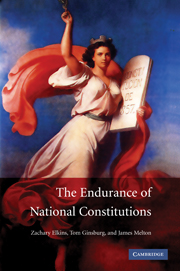Book contents
- Frontmatter
- Contents
- Preface
- 1 Introduction
- 2 How Long Should Constitutions Endure?
- 3 Conceptualizing Constitutions
- 4 What Makes Constitutions Endure?
- 5 Identifying Risks to Constitutional Life
- 6 An Epidemiological Analysis of Constitutional Mortality
- 7 Cases of Constitutional Mortality, Part I: Similar Contexts, Contrasting Outcomes
- 8 Cases of Constitutional Mortality, Part II: Contrasting Contexts, Similar Outcomes
- Conclusion
- Appendix
- References
- Index
1 - Introduction
Published online by Cambridge University Press: 05 June 2012
- Frontmatter
- Contents
- Preface
- 1 Introduction
- 2 How Long Should Constitutions Endure?
- 3 Conceptualizing Constitutions
- 4 What Makes Constitutions Endure?
- 5 Identifying Risks to Constitutional Life
- 6 An Epidemiological Analysis of Constitutional Mortality
- 7 Cases of Constitutional Mortality, Part I: Similar Contexts, Contrasting Outcomes
- 8 Cases of Constitutional Mortality, Part II: Contrasting Contexts, Similar Outcomes
- Conclusion
- Appendix
- References
- Index
Summary
In a series of exchanges with James Madison, Thomas Jefferson argued that constitutions should be rewritten every generation, declaring famously that the “dead should not govern the living.” Jefferson derided those who “look at constitutions with sanctimonious reverence, and deem them like the ark of the covenant, too sacred to be touched.” He even proposed an expiration date – one of nineteen years, a figure he came to from studying a set of actuarial tables. Madison, having only recently shepherded the U.S. document through a sometimes contentious deliberation and ratification process, saw more merit in constitutional longevity. The two carried out their lively debate by mail in two very different contexts: revolutionary France, where Jefferson served as the inaugural U.S. ambassador, and the United States, where Madison was busy putting the new American charter into effect. Although those two countries seemed to be headed in a similar institutional direction as beacons of democracy in the late eighteenth century, their constitutional trajectory would be markedly different. Why is it that the inaugural constitution drafted in Philadelphia in 1789 has survived for 220 years and counting, whereas the French Constitution of 1791 lasted a little more than a year, to be followed in French history by fourteen more constitutions? Indeed, an old joke has it that a man goes into a library and asks for a copy of the French constitution, only to be turned away with the explanation that the library does not stock periodicals.
- Type
- Chapter
- Information
- The Endurance of National Constitutions , pp. 1 - 11Publisher: Cambridge University PressPrint publication year: 2009



